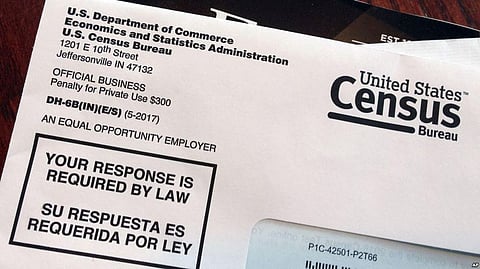
- Home
- न्यूजग्राम
- India
- World
- Politics
- Entertainment
- Culture
- Lifestyle
- Economy
- Sports
- Sp. Coverage
- Misc.
- NewsGram Exclusive
- Jobs / Internships

A federal judge has blocked the Commerce Department from including a question about U.S. citizenship on the 2020 census.
To plaintiffs in the case — a sizable coalition of states, cities and advocates — the question seemed aimed at turning the official population survey into a tool to advance Trump administration policies by discouraging immigrants from participating.
In Tuesday's ruling, which came after a two-week trial in New York, U.S. District Judge Jesse Furman said that the decision to add the citizenship question was made before data was collected to show that a change in policy was necessary.
In his 277-page ruling, Furman wrote that the decision was "pretextual" and thus violated a federal law called the Administrative Procedure Act (APA).
Migrants traveling with children walk up a hill to a waiting U.S. Border Patrol agent just inside San Ysidro, Calif., after climbing over the border wall from Playas de Tijuana, Mexico, Dec. 3, 2018. VOA
Furman said the APA requires federal agencies to study an issue before changing policies, and the Commerce Department, which oversees the Census Bureau, "violated the public trust."
Documented noncitizens
About 11 million people who live in the U.S. are undocumented, but there are also about 13 million documented noncitizens who might fear responding to the census questionnaire if citizenship is included.
"Hundreds of thousands — if not millions — of people will go uncounted in the census if the citizenship question is included," Furman said.
The U.S. census is taken every 10 years and is next scheduled for 2020. It plays a critical role in U.S. politics since the apportionment of House of Representative seats is based on population figures derived from the census and also disbursement of millions in federal funds. In addition, decisions from the location of businesses to the makeup of state and local districts are based on the census.
Plaintiffs argued that noncitizens tend to live in places that disproportionately vote Democratic, so an undercount would likely shift political power and federal spending to Republican areas.
Immigrants participate in a naturalization ceremony to become U.S. citizens in Los Angeles, Dec. 19, 2018. VOA
Furman's ruling is only the opening salvo on the citizenship question. The Supreme Court has already agreed to hear an aspect of the case in February, hoping to rule before the Census Bureau has to print its questionnaire. In addition, the government is expected to quickly appeal Furman's ruling.
Reasoned explanation
The U.S. government fought hard to keep the citizenship question out of court. When that failed, government lawyers argued that how Commerce Department Secretary Wilbur Ross reached his decision on the citizenship question was "immaterial."
"All the secretary is required to do is to provide a reasoned explanation," Deputy Assistant Attorney General Brett A. Shumate told the court. "He doesn't have to choose the best option."
Ross has said that he decided to add citizenship to the census in response to a request from the Justice Department, which said that census data on citizenship would help it better enforce the 1965 Voting Rights Act.
Migrants wait in line for food at a camp housing hundreds of people who arrived at the U.S. border from Central America with the intention of applying for asylum in the U.S., in Tijuana, Mexico, Dec. 12, 2018. VOA
Citizenship was on the questionnaire in censuses before 1960 and is still part of the American Community Survey, which samples about 2.6 percent of the population each year, in order to help local officials and businesses understand what is going on in their communities.
'Forceful rebuke'
But last January, the Census Bureau itself recommended against adding a citizenship question, estimating that at least 630,000 households would refuse to fill out the 2020 questionnaire if such a question were included.
"This victory in our case is a forceful rebuke of the administration's attempts to weaponize the census to attack immigrants and communities of color," the American Civil Liberties Union said in a statement about the case.
Along with the ACLU, plaintiffs included 18 states, the District of Columbia, several cities and some immigrant rights groups. (VOA)
